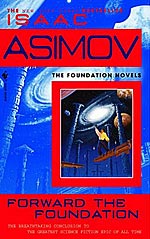
![]() verkisto
verkisto
7/26/2016
![]()
And with this volume, I bring to a close the Foundation series by Asimov (sort of; I'm still planning on reading the Benford-Bear-Brin books, since those at least have a pretty devoted following, too). I'm partly glad to be finished, since the stories tended to be somewhat repetitious and lacking in vivid characterization, but after all that Asimov did with the series and how he pulled it together with his other major science fiction novels, part of me wonders where he would have gone with it had he had more time to develop his ideas. Because as I mentioned in the last five reviews, his ideas take precedence over the storytelling.
I also found this volume to be a bit of a throwback to the first book, in that instead of it being one singular story, the novel was comprised of four distinctive shorter works that told a larger story. Each story is about Hari Seldon and his days following his end as First Minister, from his early forties to his death some forty years later. We see more of the conflicts Seldon endured, politically and personally, and while it doesn't necessarily further the idea of Foundation, we get more insight into Seldon as a person, which was far more than what we received in Foundation. But the structure of the novel into its smaller parts brought the series full circle.
So much of the story was about Seldon working on psychohistory without telling anyone save for his closest contacts that he was working on psychohistory, and that part of the story was a little tedious. The series overall had a lot of repetition in theme, structure, and narrative (each book seemed to review much of what came before, which, while necessary, was somewhat annoying when reading the stories all as one), and I wished that Asimov had tried giving his readers the benefit of the doubt at some point. The use of Dors and Rayche as a means to go into great length about the details of psychohistory also felt somewhat overused (even if it was necessary).
I enjoyed the series well enough overall, and I can see why it has the reputation it does, but when it comes to sheer storytelling, it doesn't measure up. Characterization takes a back seat to the technical details, and without that connection to the characters, it was hard for me to care much about what happened to Hari and his family. The emotional scenes felt flat, leaving me mostly unresponsive, and I found myself reading to see where Asimov was taking the ideas instead of reading to see what would happen to the characters. That just doesn't seem like the right approach to take when writing fiction.
Would I still recommend it? Yes. I'm not sure if I would recommend reading them all at once, as I did, but some time away from the series might make some of that repetition less grating. As it is, I'm looking forward to seeing what other authors have to do with the characters.